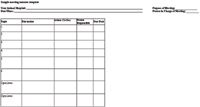Developing your management skills - How to hold staff meetings that build morale and result in positive change: Part 1 (Proceedings)
The following is a guide for making the task of taking minutes easier.
- Make sure the purpose is clearly established
- Distribute an agenda beforehand
- Choose the right time
- Limit the time of the meeting and each item to be discussed
- Start on time
- Discuss the most important items first
- Don't get side-tracked
- Assign someone to keep minutes
- End on a positive note
- See that minutes are distributed within 24 hours
- Monitor follow-up assignments and action
- Critique, evaluate, and make adjustments
Tips for taking meeting minutes
The following is a guide for making the task of taking minutes easier:
- Ensure that all of the essential elements are noted, such as date and time, name of the facilitator, main topics.
- Prepare an outline ahead of time based on the agenda and leave plenty of white space for notes. By having the topics already written down, you can jump right on to a new topic without pause.
- If it is important to note those in attendance, then prepare a list of expected attendees and check off the names as people enter the room. Or, you can pass around an attendance sheet for everyone to sign as the meeting begins.
- Don't make the mistake of recording every single comment. Concentrate on recording the important points of the discussion and taking enough notes to summarize it later. Think in terms of issues discussed, major points raised and decisions made.
- Action items are "to-do's" assigned to attendees at the meeting.
o Record the task
o Record the person responsible
o Record the date agreed upon to complete the task
- Note any new issues or open issues that were not resolved and should be recorded so that they can be carried over to a future meeting.
- If you are an active participant in the meeting, be prepared! Study the issues to be discussed and have your questions ready ahead of time. If you have to concentrate on understanding the issues while you are making your notes, they won't make any sense to you later.
- Don't wait too long to type up the minutes, do this while your memory is fresh. Be sure to have the minutes reviewed by the facilitator to ensure that you have included all important points
- Don't be intimidated by the prospect of taking minutes. The very process of recording minutes can give you a deeper understanding of the issues faced by your practice and develop your ability to focus on what's important.

Sample meeting minutes template